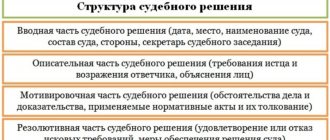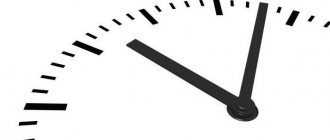General characteristics and essence of proceedings in the appellate court
Appeal proceedings are the procedure provided for by the norms of civil procedural law for appealing decisions and rulings of the court of first instance that have not entered into legal force.
An appeal means an appeal of a court decision of a court of first instance to a second instance.
In the theory of civil procedure, there are two types of appeal:
- full;
- incomplete.
An incomplete appeal is a type of appeal that means a review of the decision of the trial court based solely on the evidence that has previously been examined by the court. In case of an incomplete appeal in cases established by law, the appellate instance has the right to return the case for a new trial to the court of first instance.
A full appeal is a type of appeal that means that the case is reconsidered by the appellate court according to the rules in force in the first instance, and the parties have the right to present new facts and evidence. In a full appeal, the appellate court checks not only the decision of the trial court itself, but also the case itself, re-examining its legal and factual aspects. In case of a full appeal, the appellate court is deprived of the right to return the case for a new trial to the court of first instance and must itself adopt a final act on it in the form of a decision or ruling.
Before the amendments to the Code of Civil Procedure of the Russian Federation, which came into force on January 1, 2012, there was a full appeal in Russian civil procedural legislation. However, changes to the Civil Procedure Code of the Russian Federation introduced by Federal Law No. 353-FZ of December 9, 2010 “On Amendments to the Civil Procedure Code of the Russian Federation” provoked the emergence of conflicting opinions of scientists. So, M.Yu. Lebedev believes that a type of appeal proceedings was introduced with elements of both full and incomplete appeal, i.e. mixed appeal. S.K. Zagainova notes that the Russian model has the features of an incomplete appeal, since the appellate court checks the judicial act of the first instance court only to the extent of the appeal; new evidence can be examined only if the parties prove the impossibility of presenting it to the first instance court. A.I. Zaitsev, S.Z. Zhe-netl argue that, despite a number of transformations, in our country there is currently an institution of full appeal. The latter opinion should be supported, since the analysis of Chap. 39 allows us to conclude that the Russian civil process is characterized by a full appeal.
The purpose of the appeal is to re-examine the civil case on the merits of the stated claim in whole or in part, depending on the content of the appeal.
Errors in cassation
Lawyers make six common mistakes. The first three were discussed in the section on appeal. Three more errors are typical only for cassation.
The arguments of the complaint go beyond the scope of cassation consideration
In 99 percent of cases when cassation upholds decisions of lower courts, it indicates that the arguments of the complaint are aimed at reassessing the factual circumstances of the case and evidence. And this is not within the scope of consideration of the case in cassation. Cassation only checks whether the courts correctly applied the rules of substantive and procedural law.
The reason for this practice is that lawyers often copy the text of the appeal into the cassation complaint. For example, the complaint writes that “the conclusions of the courts do not correspond to the factual circumstances and the evidence presented in the case.”
If you want to present new evidence or perform procedural actions that are possible only in the first instance, look for unconditional grounds for reversing the decision.
In your cassation appeal, refer specifically to errors in the application of the rules - these are your main arguments. All arguments that are related to non-research or incorrect assessment of evidence are given only to confirm the court’s errors.
The arguments of the complaint do not correspond to the pleading purpose
The goal of the cassator is to achieve the reversal of judicial acts with which he does not agree. To do this, he can ask the cassation court, for example, to adopt a new judicial act in the case, to send the case for a new trial, or to leave in force one of the decisions or resolutions previously adopted in the case. Sometimes cassation officers ask to adopt a new act in the case - this is the most advantageous for the party, regardless of the circumstances of the case and the arguments that it brings.
The cassation court will not be able to adopt a new act, since to do this it will have to examine and evaluate the evidence, and the cassation court does not have the right to do this. Such a discrepancy between the request and the arguments reduces the credibility of the complaint and often raises questions and criticism in the court of cassation.
Study the case materials and select possible arguments for cassation. After this, decide how to formulate the pleading part of the cassation appeal.
Additional documents submitted too late
Lawyers often file position papers too late and draft them incorrectly. Courts usually accept documents directly at the hearing, but not cassation documents. If you submit a response to the complaint, additions, or written explanations directly to the hearing, the cassation office may reject them. For example, the court indicated that written explanations were received on the eve of the court hearing and refused to include them in the case materials.
Consider the peculiarities of the court. For example, the Arbitration Court of the Moscow District may not accept written explanations, since it considers them new evidence that the cassation cannot accept. Therefore, format additional explanations as the text of a speech - the courts usually accept it.
CALL +7 (495) 255-11-80, FREE CONSULTATION!
The right of appeal and the procedure for its implementation
The right to appeal is the opportunity provided by law to file an appeal against a decision of the first instance court that has not entered into legal force in the appellate court.
To exercise the right to appeal and initiate appeal proceedings, it is necessary to have prerequisites of an objective and subjective nature.
Prerequisites of a subjective nature: subjects of appeal.
Objective prerequisites:
- object of appeal;
- deadlines for appeal;
- procedure for filing an appeal.
Subjects having the right of appeal include persons participating in the case. Persons participating in the case have the right to appeal the decision of the court of first instance, regardless of whether they were directly involved in the consideration of the case in the court of first instance. It is important that they are involved or allowed by the judge to participate in the proceedings as persons participating in the case.
Judicial representatives also have the right to appeal, but only if these powers are specified in the power of attorney to conduct a case in court issued by the represented person (Article 54). The legal successors of the persons participating in the case also have the right to file an appeal.
According to the content of Art. 34, 35 and 45 of the Code of Civil Procedure of the Russian Federation and in conjunction with the provisions of the resolutions of the Plenum of the Supreme Court of the Russian Federation of January 20, 2003 No. 2 “On some issues that arose in connection with the adoption and entry into force of the Civil Procedure Code of the Russian Federation”, as well as of June 19 2012 No. 13 “On the application by courts of the norms of civil procedural legislation regulating proceedings in the appellate court”, the prosecutor participating in the case is the prosecutor who applied to the court of first instance with a statement in defense of the rights, freedoms and legitimate interests of other persons or entered in the process to give an opinion on cases in which his participation is provided for by the Code of Civil Procedure of the Russian Federation and other federal laws. In this case, the prosecutor has the right to bring an appeal regardless of his personal presence at the trial court hearing.
The prosecutor has the right to bring an appeal also if he was not invited by the court of first instance to participate in a case in which his participation is mandatory by law (Part 3 of Article 45 of the Code of Civil Procedure of the Russian Federation).
In addition, the right of appeal belongs to persons who were not involved in the case, but whose rights and obligations the court of first instance made a decision (i.e., by a court decision they are deprived of rights, limited in rights, vested with rights and (or) rights to them responsibilities are assigned). In the Code of Civil Procedure of the Russian Federation, the possibility of exercising this right by this category of persons is contained in Part 3 of Art. 320 Code of Civil Procedure of the Russian Federation.
The legal successors of persons participating in the case who did not participate in the process during the consideration of the case in the court of first instance also have the right to appeal.
In accordance with Art. 4, 34, 35, 46 and 47 of the Code of Civil Procedure of the Russian Federation, the right to appeal court decisions of the court of first instance is also enjoyed by persons who, in cases provided for by law, apply to the court for the protection of the rights, freedoms and legitimate interests of other persons or enter into the process to give an opinion on the case in order to fulfill the duties assigned to them by federal law.
From the contents of the provisions of sub. 1 clause 1 art. 29 of the Federal Constitutional Law of February 26, 1997 No. 1-FKZ “On the Commissioner for Human Rights in the Russian Federation” it follows that the Commissioner for Human Rights in the Russian Federation has the right to appeal court decisions of the court of first instance if he participated personally or through his representative when considering the case in the court of first instance. This right is exercised by him in the manner and within the time limits provided for in Chapter 39 Code of Civil Procedure of the Russian Federation.
The objects of appeal are:
- decisions of the court of first instance that have not entered into legal force (in whole or in part) (for example, the operative or reasoning part can be appealed);
- additional decision, if it was made by the court;
- default judgment;
- in accordance with Art. 331 of the Code of Civil Procedure of the Russian Federation, rulings of the court of first instance.
A court order cannot be appealed. In accordance with Art. 376 of the Code of Civil Procedure of the Russian Federation, it can be appealed in cassation.
Deadlines for appeal. The period for the persons participating in the case to submit an appeal, and for the prosecutor to submit an appeal is 1 month and is calculated from the date the court of first instance makes a decision in final form. Making a decision in final form means a decision of the court of first instance, consisting of introductory, descriptive, motivational and operative parts. In this case, the provisions of Art. 199 of the Code of Civil Procedure of the Russian Federation, according to which a judge may exercise his right to postpone drawing up a reasoned decision for a period of no more than 5 days.
According to Part 3 of Art. 199 of the Code of Civil Procedure of the Russian Federation, a magistrate may not draw up a reasoned court decision on a case considered by him. However, to appeal the decision of the magistrate, persons wishing to exercise the right to file an appeal must contact the magistrate with an application to draw up a reasoned court decision, which can be filed within three days from the date of announcement of the operative part of the court decision, if the persons involved in the case, their representatives were present at the court hearing and within 15 days from the date of announcement of the operative part of the court decision, if the persons participating in the case, their representatives were not present at the court hearing.
In accordance with Art. 201 of the Code of Civil Procedure of the Russian Federation, an additional decision may be an independent object of appeal. In this case, the period for appeal is calculated from the moment the additional decision is made.
A decision in absentia may be appealed by the parties within a month after the expiration of the deadline for the defendant to file an application to cancel this decision, and if such an application was filed, then within a month from the date of the court’s ruling to refuse to satisfy this application.
The legislation may provide for shortened deadlines for filing appeals and submitting court decisions in certain categories of cases. So, in Part 8 of Art. 2324 of the Code of Civil Procedure of the Russian Federation provides for the possibility of appealing to an appellate court a decision made based on the results of consideration of a case in a simplified procedure within 15 days from the date of its adoption, and in the case of drawing up a reasoned court decision at the request of persons participating in the case, their representatives - from the date making a decision to the final form. In addition, a shortened 10-day appeal period is provided for in Part 1 of Art. 24417 on the decision in the case of the return of the child or the exercise of rights of access, as well as Part 21 of Art. 274 on the decision to approve an application for adoption of a child.
The procedure for filing a complaint by an appellant. The appeal or presentation is drawn up in accordance with the requirements of Art. 322 Code of Civil Procedure of the Russian Federation. An appeal or presentation is filed through the court that made the decision being appealed. The current legislation does not provide for the possibility of filing an appeal or submitting it directly to the appellate authority. If the appellant nevertheless files an appeal directly to the appellate court, then in such a situation the appeal must be sent to the court that made the decision for further action in accordance with the general rules.
Before the expiration of the period for filing an appeal or presentation from the moment the decision is made in final form, the appealed case cannot be sent to the appellate authority. After the expiration of the appeal period, the case materials, together with the appeal, presentation, received objections and documents attached to them are sent to the appellate authority.
In accordance with Art. 323 of the Code of Civil Procedure of the Russian Federation, an appeal or presentation is left without progress in the following cases:
- when the content of the complaint or presentation does not meet the requirements of Part 1 of Art. 322 Code of Civil Procedure of the Russian Federation;
- when the appeal contains demands that were not previously stated to the magistrate;
- the complaint filed by the representative is not accompanied by a power of attorney or other document certifying the authority of the representative, if there is no such authority in the case;
- the complaint has not been paid the state fee, if it is payable.
A private complaint or a prosecutor’s presentation may be filed against a judge’s decision to leave an appeal or presentation without progress.
An appeal or submission is subject to return in the following cases:
- failure to comply within the prescribed period with the judge’s instructions contained in the ruling on leaving the complaint or presentation without progress;
- expiration of the appeal period, if the complaint or presentation does not contain a request for restoration of the period or its restoration is refused.
The appeal is also returned at the request of the person who filed the complaint, the appeal presentation - if it is withdrawn by the prosecutor, if the case is not sent to the court of appeal.
The issue of returning an appeal or presentation is decided by the court of first instance. At the same time, the ruling on the return of the appeal or presentation must indicate the basis on which the court came to the conclusion that the complaint or presentation should be returned to the applicant, the court’s conclusion is drawn and the procedure and deadlines for appeal are explained. The ruling on the return of the appeal or presentation is appealed to a higher court within 15 days from the date of the ruling by the court of first instance.
After receiving an appeal or presentation, the court of first instance is obliged to send to the persons participating in the case copies of the complaint, presentation and documents attached to them. Persons participating in the case, after familiarizing themselves with the appeal, presentation, have the right to submit to the court of first instance objections in writing regarding the appeal, presentation, with the attachment of documents confirming these objections, and their copies, which are submitted in quantity according to the number of persons participating in the case. in fact. Taking into account the fact that the court of first instance may receive several appeals, it should be assumed that objections can also be submitted by different persons participating in the case. Persons participating in the case have the right to familiarize themselves with the materials of the case, with the received complaints, presentations and objections regarding them.
The Code of Civil Procedure of the Russian Federation does not establish a time limit for the court to transfer copies of complaints, presentations and documents attached to them to the persons participating in the case. It should be assumed that the court should do this immediately, since after the expiration of the appeal period, the court of first instance must send the case with the appeal, presentation and objections already received regarding them to the appellate court. Before the appeal period expires, the case cannot be sent to the appellate court.
Documents attached to the appeal under the Code of Civil Procedure of the Russian Federation
After the claims of the complainant, it is necessary to list all the documents attached to the appeal. A copy of the complaint must be sent to the participants in the case in advance. And evidence of the direction (delivery) should be attached to the complaint. If it is planned to present additional evidence along with the complaint, you need to draw up (either separately or in the text of the document) a statement on the inclusion of evidence in the appeal.
Also attached to the appeal is a receipt for payment of the state fee (if the applicant is not exempt from paying it).
| The current amount of state duty payment today: | |
| state fee to court |
At the end of the appeal, the applicant must put his signature and the date of the appeal. The date of compilation does not have to coincide with the date of filing.
The procedure for considering a case in an appellate court
The procedure for considering a case in the court of appeal is carried out according to the rules of proceedings in the court of first instance, taking into account the features provided for in Chapter. 39 Code of Civil Procedure of the Russian Federation.
Cases of complaints against judicial decisions of magistrates that have not entered into legal force are considered on appeal alone by judges of the relevant district courts. In all other cases, civil cases in appellate courts are considered collegially.
The period for consideration of the case should not exceed two months from the date of receipt of the complaint or submission to the court of appeal. The Supreme Court of the Russian Federation considers a case received on appeal or presentation within a period not exceeding three months from the date of its receipt.
After receiving the complaint, the appellate court notifies the persons participating in the case of the time and place of consideration of the complaint or presentation in the appeal procedure.
The procedure for consideration is enshrined in Art. 327 Code of Civil Procedure. It is necessary to distinguish, just as when considering a case in a court of first instance, three stages.
The first stage is preparation for consideration. At the appointed time, the presiding judge opens the hearing of the appellate court. He announces what case is being considered, on whose appeal, presentation it is subject to consideration and against the decision of which court this complaint, presentation was filed, finds out which of the persons participating in the case, their representatives appeared, establishes the identity of those who appeared, checks the powers of officials, their representatives and explains to the persons participating in the case their procedural rights and obligations.
The second stage is consideration of the case on its merits. Next, the court proceeds to consider the case on its merits. Consideration of the case on its merits begins with a report by the presiding judge or one of the judges. The report sets out the circumstances of the case, the content of the decision of the court of first instance, the arguments of the appeal, presentations and objections received regarding them, the content of new evidence presented to the court, and also provides other data that the court needs to consider to verify the decision of the court of first instance.
After the report, explanations of the persons participating in the case and their representatives who appeared at the court hearing are heard. The first person to speak is the person who filed the appeal. If the prosecutor filed an appeal, he is the first to give explanations. If both parties appeal a court decision, the plaintiff will act first.
After the explanations of the person who filed the appeal, or the prosecutor, if he brought an appeal, and other persons participating in the case, their representatives, the appellate court, if there are appropriate petitions, reads out the evidence available in the case, after which it proceeds to examine the new evidence accepted by the court.
You should also pay attention to a number of features of the proceedings in the appellate court. In appellate proceedings, only part of the decision can be appealed. In this case, the appellate court checks the legality and validity of the decision only in the appealed part. However, in the interests of legality, it has the right to check the decision of the court of first instance in full. Regardless of the arguments contained in the appeal or presentation, the appellate court must check whether the court of first instance violated the rules of procedural law, which are grounds for overturning the decision of the court of first instance.
New claims that were not the subject of consideration in the court of first instance cannot be submitted to the appellate court.
During the consideration of the case in the appellate court, the plaintiff may abandon the claim, the defendant may admit the claim, and the parties may enter into a settlement agreement. The listed procedural actions must be expressed in written applications submitted to the appellate court. If the plaintiff’s refusal of the claim, the recognition of the claim by the defendant, the terms of the settlement agreement between the parties were stated at the court hearing, such refusal, recognition, conditions are entered into the minutes of the court session and must be signed respectively by the plaintiff, the defendant, and the parties to the settlement agreement.
The procedure and consequences of considering the plaintiff’s application to abandon the claim or the parties’ application to conclude a settlement agreement are determined according to the rules established by Parts 2 and 3 of Art. 173 Code of Civil Procedure of the Russian Federation. When accepting the plaintiff's refusal of the claim or when approving a settlement agreement between the parties, the appellate court cancels the court decision and terminates the proceedings. If the defendant recognizes the claim and accepts it by the appellate court, a decision is made to satisfy the claims made by the plaintiff.
A person who has applied to the appellate court has the right to refuse the appeal or presentation. To refuse an appeal, you must submit a written application to the appellate court before the court issues an appeal ruling.
As part of the judicial debate, after clarification of the circumstances of the case and examination of the evidence, the appellate court provides the persons participating in the case with the opportunity to speak in the judicial debate in the same sequence in which they gave explanations.
The third stage is the issuance of an appeal ruling. After the end of the court session, the court retires to the deliberation room to make an appeal ruling.
What is an appeal against a court decision?
An appeal is a complaint against a court decision that has not entered into legal force. This is the first stage of checking the legality and validity of a court decision. Moreover, it is the most effective, since only at this stage is the case fully verified. Such persons will have to substantiate this fact in detail in the text of the complaint (Article 320 of the Code of Civil Procedure of the Russian Federation)
An appeal against a court decision must be filed within a certain time frame and in compliance with the form and content. Any participant in the case can do this. And sometimes other persons (when their rights and legitimate interests are violated by a decision). Such a complaint can be filed against decisions of justices of the peace, district and city courts, regional, regional and republican courts, as well as decisions of the Supreme Court of the Russian Federation.
The appeal is considered by a higher authority - the court of appeal. The list of appellate courts is given in Article 320.1 of the Code of Civil Procedure of the Russian Federation. Based on the results of consideration of the complaint, the decision may be cancelled, changed or left unchanged. The appeal also has other powers, for example, to overturn the decision and terminate the consideration of the case. The full list of powers of the appellate instance is listed in Article 328 of the Code of Civil Procedure of the Russian Federation.
The result of the consideration of the complaint is formalized by an appeal ruling. The issuance of an appeal ruling means the entry into force of a court decision.
The decision of the district court can be appealed to a higher court within 1 month from the date of its adoption. The period begins to run from the moment the solution is produced in full. Usually, at a court hearing, the judge announces only the operative part of the decision, postponing the preparation of the full decision for up to 5 days. The judge announces the date of production of the decision in final form when announcing the decision at the end of the court hearing. If this is not done, you need to clarify the date of production of the reasoned decision in court when receiving a copy of the decision.
| Note! |
| Application for drawing up a reasoned court decision |
Powers of the appellate court
After re-considering the appeal or presentation, the appellate court, taking into account the received complaints, presentations, objections, as well as new evidence, has the right to:
1) leave the decision of the court of first instance unchanged, the appeal or presentation is not satisfied. The appellate court invokes this authority if, when checking the decision of the first instance court, it is convinced that the decision is legal and justified. A decision is legal and justified when it is made in accordance with the rules of substantive law and in strict compliance with the rules of procedural law, and all facts relevant to the case under consideration are confirmed by evidence. The court issues a ruling to refuse to satisfy the appeal, presentation, indicating the reasons why the arguments of the complaint, presentation are recognized as not being grounds for canceling the decision of the court of first instance;
2) cancel or change the decision of the court of first instance in whole or in part and make a new decision on the case. If the court comes to the conclusion that the decision made by the trial court has significant errors, then it has the right to cancel the decision completely and make a new decision on the case. Taking into account the fact that, as a general rule, the appellate court cannot send the case for a new trial, it must correct all errors on its own. Thus, the decision can be canceled either in whole or in part;
3) cancel the decision of the court of first instance in whole or in part and terminate the proceedings in the case or leave the application without consideration in whole or in part. This power presupposes the end of the case without making a decision. Upon re-examination, the appellate court may also identify circumstances that are grounds for terminating the proceedings (Article 220 of the Code of Civil Procedure) or leaving the application without consideration (Article 222 of the Code of Civil Procedure). In this case, after the decision of the first instance court is canceled in whole or in part, the appellate court terminates the proceedings in the case or leaves the application without consideration. If the appellate court leaves the application without consideration, then the interested person, after eliminating the circumstances that served as the basis for leaving the application without consideration, may again appeal to the court of first instance with the corresponding application in the general manner;
4) leave the appeal, presentation without consideration on the merits, if the complaint, presentation was filed after the expiration of the period for appeal and the issue of restoring this period has not been resolved. The power granted is intended to correct a clear error by the trial court. Unfortunately, according to the rules established in the Code of Civil Procedure of the Russian Federation, the appellate court does not have the opportunity to send the case for a new trial to the court of first instance.
However, it should be noted that in practice this possibility remains with the appellate court due to the existence of the legal position of the Constitutional Court of the Russian Federation, expressed in the ruling of July 3, 2007 No. 623-O-P “At the request of the Novooskolsky District Court of the Belgorod Region to verify the constitutionality of the paragraph fourth article 328 of the Civil Procedure Code of the Russian Federation.” The Constitutional Court of the Russian Federation in its ruling noted that par. 4 tbsp. 328 of the Code of Civil Procedure of the Russian Federation, in its constitutional and legal meaning, does not prevent the appellate court from considering an appeal, a motion to cancel the decision of the magistrate if he considers a case in violation of the rules of jurisdiction and send the case to the court whose jurisdiction the case is assigned by law, or ( if the case is within the jurisdiction of the court itself) accept it for its proceedings as a court of first instance.
A different interpretation of this legal provision would make it impossible to correct a significant (fundamental) judicial error made during the proceedings in the court of first instance, would violate the right of interested persons to have their case considered in that court and by the judge to whose jurisdiction it is assigned by law, which is not consistent with the very essence of justice, and would create a regulatory prerequisite for violating Parts 1 and 2 of Art. 17, parts 1 and 2 art. 18, parts 1 and 2 art. 46, part 1 art. 47, part 3 art. 55 and part 3 of Art. 56 of the Constitution of the Russian Federation, Art. 6 of the Convention for the Protection of Human Rights and Fundamental Freedoms and Art. 14 of the International Covenant on Civil and Political Rights.
It is also necessary to mention the resolution of the Constitutional Court of the Russian Federation of April 21, 2010 No. 10-P “In the case of verifying the constitutionality of part one of Article 320, part two of Article 327 and Article 328 of the Civil Procedure Code of the Russian Federation in connection with the complaint of citizen E.V. Aleynikova and the limited liability company “Three K” and requests from the Norilsk City Court of the Krasnoyarsk Territory and the Central District Court of the city of Chita,” which states that the interrelated provisions of Part 2 of Art. 327 and art. 328 of the Code of Civil Procedure of the Russian Federation, establishing the powers of the appellate court when considering appeals - to the extent that these provisions in the system of current legal regulation do not allow the appellate court to cancel the decision of the magistrate on unconditional grounds, namely in the cases provided for in paragraph. 2 and 4 hours 2 tbsp. 364 of the Code of Civil Procedure of the Russian Federation (consideration of a case by the court in the absence of a person participating in the case and not notified of the time and place of the court hearing; resolution by the court of the issue of the rights and obligations of a person not involved in the case), send the case to the magistrate for a new consideration, — violate the principle of equality in the implementation of the right to access to justice and the right to judicial protection and thereby contradict Part 1 of Art. 19, part 1 art. 46, part 1 art. 47, part 3 art. 55 and part 3 of Art. 123 of the Constitution of the Russian Federation.
Complaint to the Court of Appeal - additional materials
In addition to the complaint itself and knowledge of its preparation and submission, the applicant will need additional information on the consideration of the complaint in the appellate court.
Please note the specifics of filing an appeal with magistrates. For more information about the appeal: Appeal.
Consideration of appeals: Procedure for appeal.
About a sample objection to an appeal: Objections to an appeal.
Download a sample complaint against a decision of a magistrate: Appeal against a decision of a magistrate.
Theory and practice of appealing against a ruling of the first instance: Private complaint against a court ruling.
About appealing appellate rulings: Cassation appeal in a civil case.
Grounds for canceling or changing the decision of the court of first instance on appeal
The Resolution of the Plenum of the RF Armed Forces dated December 19, 2003 No. 23 “On a Judicial Decision” formulates the basic requirements for a judicial decision. These include legality and validity.
A decision is legal when it is made in strict compliance with the rules of procedural law and in full compliance with the rules of substantive law that are subject to application to a given legal relationship, or is based on the application, where necessary, of an analogy of law or an analogy of law.
The decision is justified when the facts relevant to the case are confirmed by evidence examined by the court that meets the requirements of the law on their relevance and admissibility, or by circumstances that do not require proof (Articles 55, 59-61, 67 of the Code of Civil Procedure of the Russian Federation), as well as when it contains exhaustive conclusions of the court arising from the established facts.
Thus, based on the content of these requirements and the meaning of Part 1 of Art. 330 of the Code of Civil Procedure of the Russian Federation, all grounds for canceling or changing a court decision on appeal can be divided into two groups:
- grounds that entail the unfoundedness of the decision;
- grounds entailing the illegality of the decision.
The grounds that entail the unjustifiedness of the decision include:
- incorrect determination of circumstances relevant to the case;
- failure to prove the circumstances relevant to the case established by the court of first instance;
- discrepancy between the conclusions of the court of first instance, set out in the court decision, and the circumstances of the case;
The grounds leading to the illegality of a decision include:
- violation or incorrect application of substantive law or procedural law.
The incorrect application of substantive law should be understood as situations where the court:
- did not apply the law to be applied;
- applied a law that should not be applied;
- misinterpreted the law.
Regarding the violation or incorrect application of procedural law, it should be noted that in parts 3 and 4 of Art. 330 of the Code of Civil Procedure of the Russian Federation mentions two groups of grounds:
1) violations that led or could lead to the adoption of an incorrect decision. In this case, we are talking about such violations, the materiality of which for the final decision in the case must be proven to interested parties and assessed by the court. A decision of the court of first instance that is essentially correct cannot be overturned for formal reasons alone.
2) violations entailing unconditional cancellation of the court decision. These include:
- consideration of the case by the court in an illegal composition;
- consideration of the case in the absence of any of the persons participating in the case and not properly notified of the time and place of the court hearing;
- violation of rules regarding the language in which legal proceedings are conducted;
- adoption by the court of a decision on the rights and obligations of persons not involved in the case;
- the court decision was not signed by the judge or any of the judges, or the court decision was signed by the wrong judge or judges who were part of the court that considered the case;
- absence of a court record in the case;
- violation of the rule on the secrecy of the conference of judges when making a decision.
If these grounds exist, the appellate court considers the case according to the rules of proceedings in the court of first instance, without taking into account the specifics provided for in appellate proceedings. On the transition to consideration of the case according to the rules of procedure in the court of first instance, a ruling is issued indicating the actions that must be performed by the persons participating in the case and the time frame for their completion. However, the appellate ruling of the court adopted following the consideration of the case in the court of appeal comes into force according to the rules of the court of second instance, i.e. from the date of its issuance.
Filing an appeal against a court decision in a civil case
An appeal against a court decision is filed through the court that heard the civil case. It is this court that decides on the possibility of accepting the complaint and carries out the actions provided for in Article 325 of the Code of Civil Procedure of the Russian Federation. After which it sends the complaint along with the civil case to the appellate court. If a complaint is filed with the court of appeal, it will still be returned to the court that heard the civil case to decide whether to accept it.
The deadline for filing an appeal, as already noted, is 1 month from the date of issuing a reasoned court decision. The missed deadline for appeal can be restored at the request of the applicant, which is submitted simultaneously with the complaint.
| Note! |
| Application for restoration of the deadline for filing an appeal |
After filing an appeal, you must wait until it is accepted. If the appeal is accepted, the complainant will receive notice of the appointment of the case to the appellate authority. If a complaint is left without action, its shortcomings must be corrected. And if the complaint is returned, you need to look at the reasons for the return. And either restore the deadline or submit it to another authority. The option of appealing the court’s ruling to return the complaint (private complaint) is not excluded.






